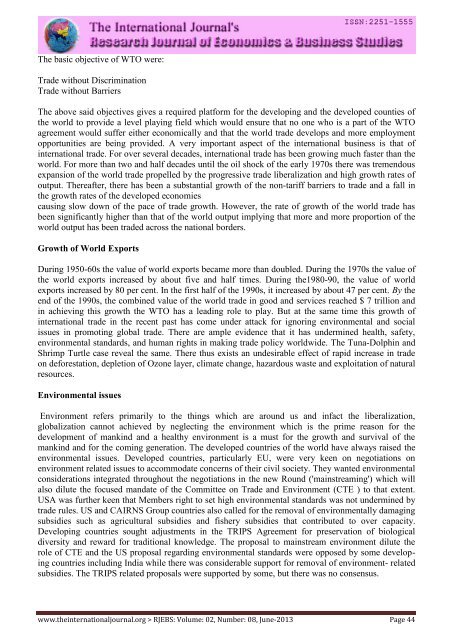Research Journal of Economics & Business Studies - RJEBS - The ...
Research Journal of Economics & Business Studies - RJEBS - The ...
Research Journal of Economics & Business Studies - RJEBS - The ...
- No tags were found...
You also want an ePaper? Increase the reach of your titles
YUMPU automatically turns print PDFs into web optimized ePapers that Google loves.
<strong>The</strong> basic objective <strong>of</strong> WTO were:<br />
Trade without Discrimination<br />
Trade without Barriers<br />
<strong>The</strong> above said objectives gives a required platform for the developing and the developed counties <strong>of</strong><br />
the world to provide a level playing field which would ensure that no one who is a part <strong>of</strong> the WTO<br />
agreement would suffer either economically and that the world trade develops and more employment<br />
opportunities are being provided. A very important aspect <strong>of</strong> the international business is that <strong>of</strong><br />
international trade. For over several decades, international trade has been growing much faster than the<br />
world. For more than two and half decades until the oil shock <strong>of</strong> the early 1970s there was tremendous<br />
expansion <strong>of</strong> the world trade propelled by the progressive trade liberalization and high growth rates <strong>of</strong><br />
output. <strong>The</strong>reafter, there has been a substantial growth <strong>of</strong> the non-tariff barriers to trade and a fall in<br />
the growth rates <strong>of</strong> the developed economies<br />
causing slow down <strong>of</strong> the pace <strong>of</strong> trade growth. However, the rate <strong>of</strong> growth <strong>of</strong> the world trade has<br />
been significantly higher than that <strong>of</strong> the world output implying that more and more proportion <strong>of</strong> the<br />
world output has been traded across the national borders.<br />
Growth <strong>of</strong> World Exports<br />
During 1950-60s the value <strong>of</strong> world exports became more than doubled. During the 1970s the value <strong>of</strong><br />
the world exports increased by about five and half times. During the1980-90, the value <strong>of</strong> world<br />
exports increased by 80 per cent. In the first half <strong>of</strong> the 1990s, it increased by about 47 per cent. By the<br />
end <strong>of</strong> the 1990s, the combined value <strong>of</strong> the world trade in good and services reached $ 7 trillion and<br />
in achieving this growth the WTO has a leading role to play. But at the same time this growth <strong>of</strong><br />
international trade in the recent past has come under attack for ignoring environmental and social<br />
issues in promoting global trade. <strong>The</strong>re are ample evidence that it has undermined health, safety,<br />
environmental standards, and human rights in making trade policy worldwide. <strong>The</strong> Tuna-Dolphin and<br />
Shrimp Turtle case reveal the same. <strong>The</strong>re thus exists an undesirable effect <strong>of</strong> rapid increase in trade<br />
on deforestation, depletion <strong>of</strong> Ozone layer, climate change, hazardous waste and exploitation <strong>of</strong> natural<br />
resources.<br />
Environmental issues<br />
Environment refers primarily to the things which are around us and infact the liberalization,<br />
globalization cannot achieved by neglecting the environment which is the prime reason for the<br />
development <strong>of</strong> mankind and a healthy environment is a must for the growth and survival <strong>of</strong> the<br />
mankind and for the coming generation. <strong>The</strong> developed countries <strong>of</strong> the world have always raised the<br />
environmental issues. Developed countries, particularly EU, were very keen on negotiations on<br />
environment related issues to accommodate concerns <strong>of</strong> their civil society. <strong>The</strong>y wanted environmental<br />
considerations integrated throughout the negotiations in the new Round ('mainstreaming') which will<br />
also dilute the focused mandate <strong>of</strong> the Committee on Trade and Environment (CTE ) to that extent.<br />
USA was further keen that Members right to set high environmental standards was not undermined by<br />
trade rules. US and CAIRNS Group countries also called for the removal <strong>of</strong> environmentally damaging<br />
subsidies such as agricultural subsidies and fishery subsidies that contributed to over capacity.<br />
Developing countries sought adjustments in the TRIPS Agreement for preservation <strong>of</strong> biological<br />
diversity and reward for traditional knowledge. <strong>The</strong> proposal to mainstream environment dilute the<br />
role <strong>of</strong> CTE and the US proposal regarding environmental standards were opposed by some developing<br />
countries including India while there was considerable support for removal <strong>of</strong> environment- related<br />
subsidies. <strong>The</strong> TRIPS related proposals were supported by some, but there was no consensus.<br />
www.theinternationaljournal.org > <strong>RJEBS</strong>: Volume: 02, Number: 08, June-2013 Page 44

















